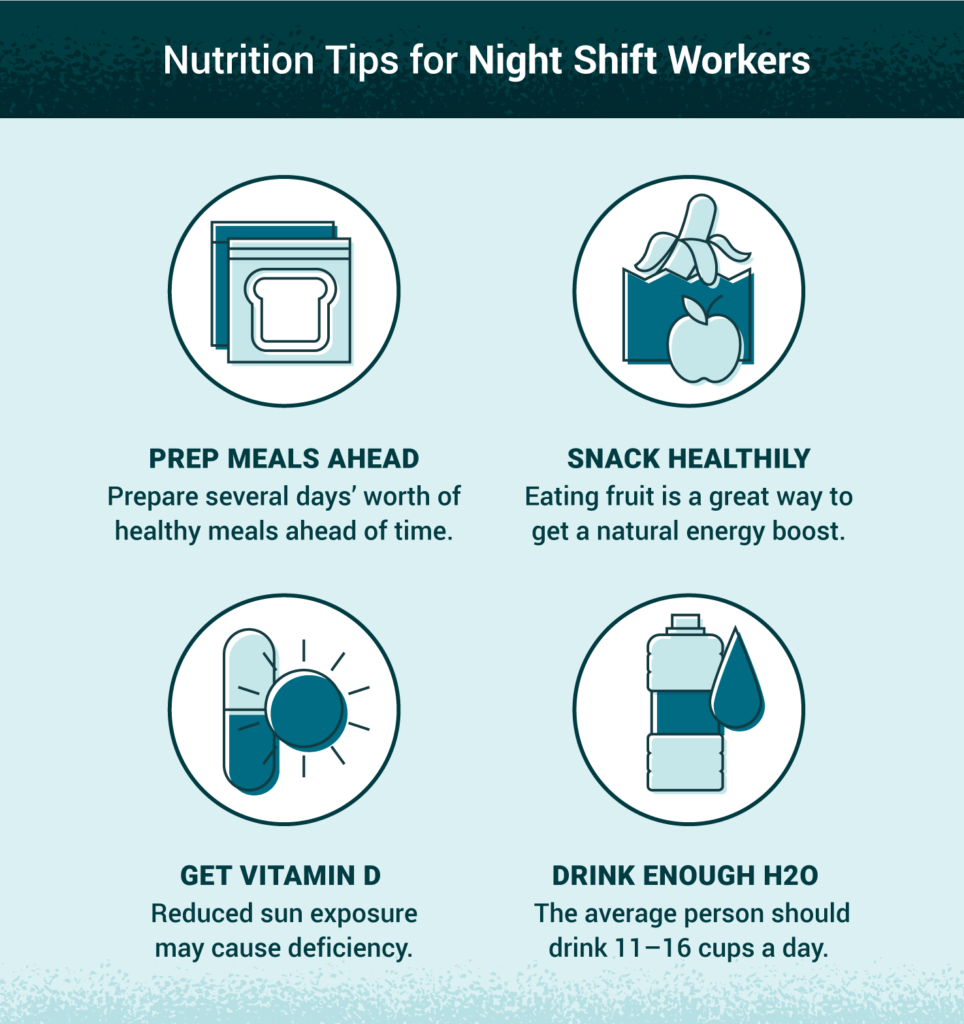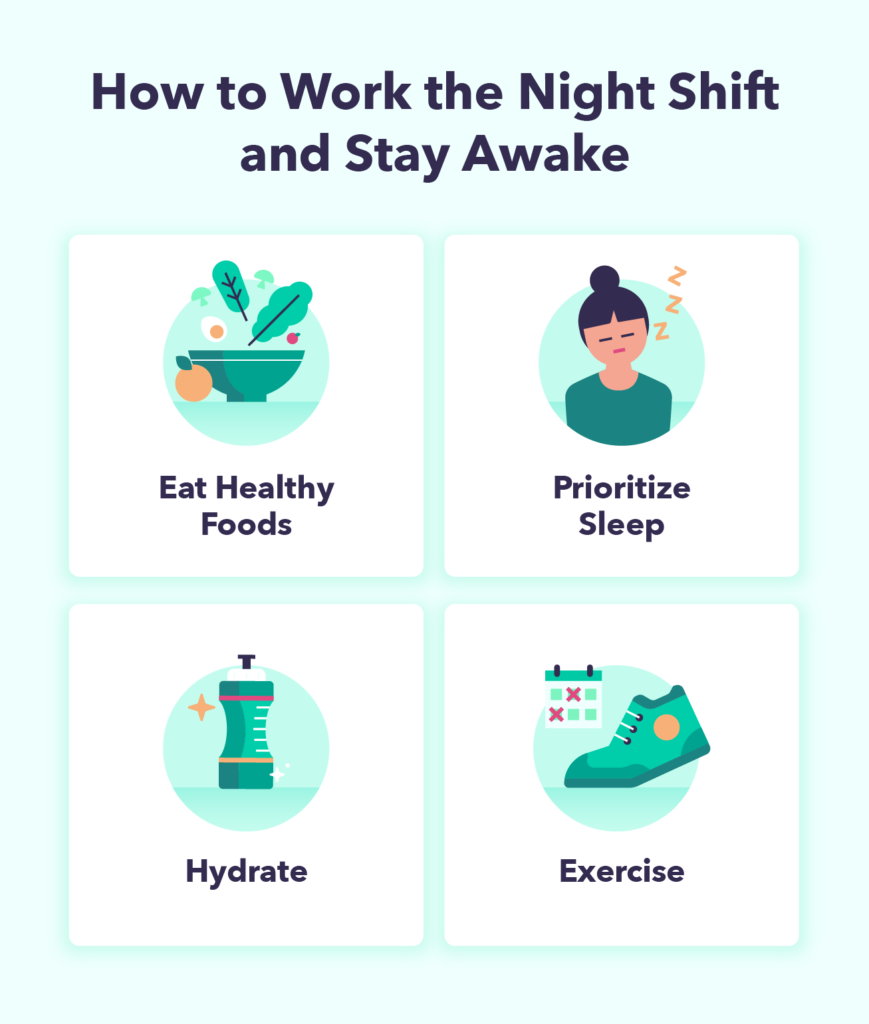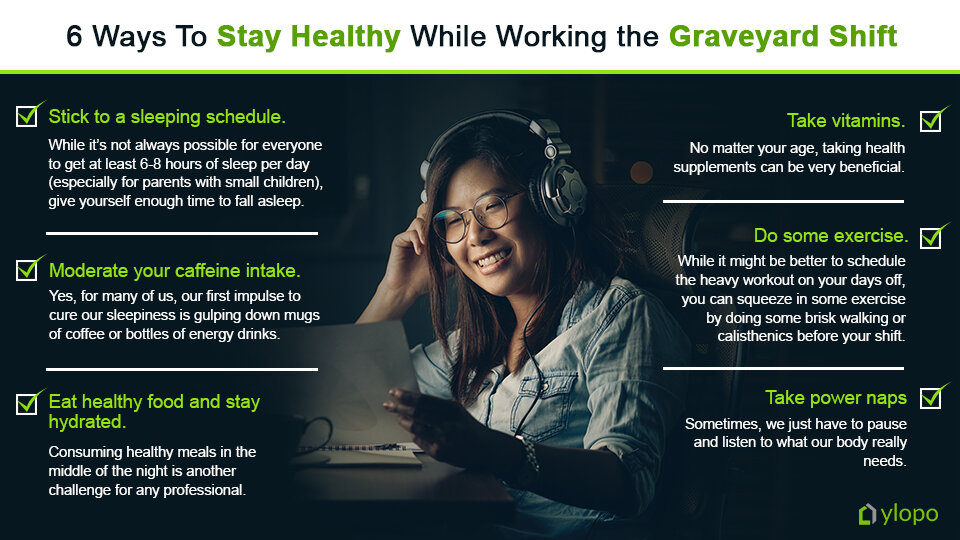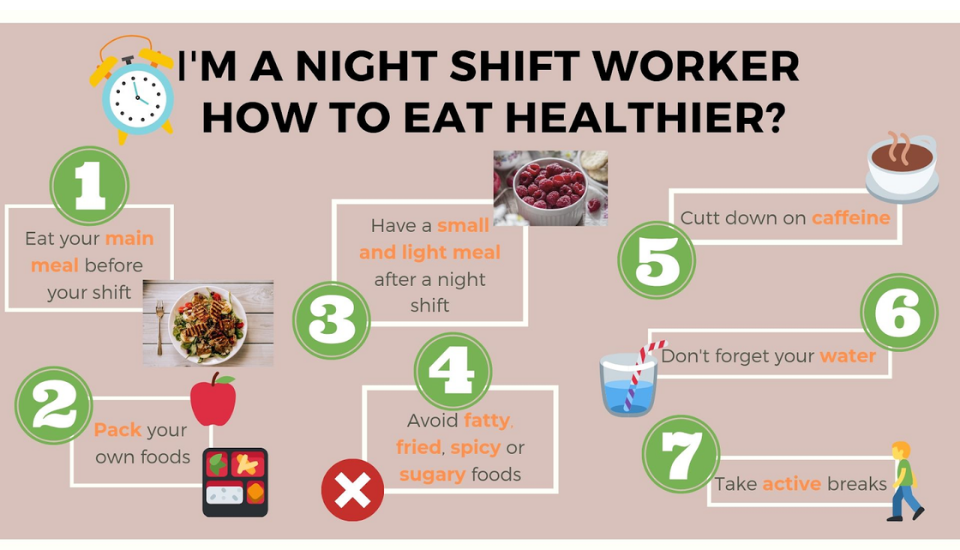Being a night shift worker can present its own set of challenges when it comes to maintaining a healthy lifestyle. From disrupted sleep patterns to limited access to healthy food options, it can be difficult to prioritize self-care. However, there are several strategies that can help night shift workers stay healthy and thrive in their unique work schedule. Whether it’s establishing a consistent sleep routine, prioritizing nutrition and exercise, or finding ways to manage stress, this article will provide practical tips and insights to help night shift workers prioritize their health and well-being.

This image is property of i0.wp.com.
Maintaining a Healthy Sleep Schedule
Establishing a Regular Routine
To maintain a healthy sleep schedule, it is important to establish a regular routine. This means going to bed and waking up at the same time every day, even on weekends. By keeping a consistent sleep schedule, your body can adjust to the shift in sleep patterns and improve the quality of your rest. Establishing a routine also involves creating a relaxing bedtime ritual, such as reading a book, taking a warm bath, or practicing meditation, to signal to your body that it is time to wind down and prepare for sleep.
Creating a Sleep-Friendly Environment
Creating a sleep-friendly environment is essential for night shift workers. This involves making sure your bedroom is dark, cool, and quiet during the day when you are trying to sleep. Consider using blackout curtains or eye masks to block out sunlight, wearing earplugs or using white noise machines to minimize noise disturbances, and setting the temperature in your bedroom to a comfortable level. Additionally, investing in a good quality mattress and pillows that provide adequate support can enhance your sleep quality.
Managing Daytime Sleep
One of the challenges for night shift workers is getting enough quality sleep during the daytime. To manage daytime sleep, it can be helpful to establish a pre-sleep routine that includes activities to relax and unwind. This may involve dimming the lights in your home, turning off electronic devices, and creating a quiet and peaceful environment. It is also recommended to limit caffeine intake close to bedtime, as it can make it more difficult to fall asleep. Additionally, using sleep aids like blackout curtains, eye masks, and white noise machines can make it easier to create a conducive environment for daytime sleep.
Minimizing Disruptions
To maintain a healthy sleep schedule, it is important to minimize disruptions that can interfere with your sleep. This may include informing family members or housemates of your schedule so they can reduce noise or interruptions during your designated sleep hours. It can also be helpful to silence your phone or use the “do not disturb” mode to prevent unnecessary notifications. By setting boundaries and creating a quiet and peaceful environment, you can minimize disruptions and ensure a restful sleep.
Eating Well to Boost Energy Levels
Planning Nutritious Meals
Eating well is crucial for night shift workers to maintain their energy levels and overall health. Planning nutritious meals can help provide the necessary nutrients and sustain energy throughout the night. It is important to include a balance of protein, carbohydrates, and healthy fats in your meals. Incorporating lean proteins such as chicken, fish, tofu, and beans can help regulate blood sugar levels and keep you feeling satisfied. Whole grains, fruits, and vegetables should also be included in your meals to provide essential vitamins, minerals, and fiber.
Avoiding Heavy and Fatty Foods
When planning meals, it is important to avoid heavy and fatty foods that can make you feel sluggish and tired. These foods can be harder to digest, leading to feelings of discomfort and drowsiness. Instead, opt for lighter options such as salads, soups, and stir-fried vegetables. Additionally, avoiding foods high in sugar and processed carbohydrates can help prevent energy crashes and promote sustained energy levels throughout the night.
Choosing Healthy Snacks
In addition to planning nutritious meals, choosing healthy snacks is equally important for night shift workers. Snacks can help provide an energy boost during long night shifts. Opt for snacks that are high in protein and fiber, such as nuts, seeds, yogurt, or fresh fruits. These snacks can help keep you feeling full and satisfied, without causing a spike in blood sugar levels.
Staying Hydrated
Maintaining proper hydration is essential for overall health and energy levels. It is important for night shift workers to drink enough water throughout their shift to stay hydrated. Keep a water bottle with you at all times and sip on water regularly. Avoid relying on sugary or caffeinated beverages for hydration, as they can lead to dehydration and energy crashes. Drinking herbal teas or flavored water can add variety to your hydration routine while keeping you refreshed.

This image is property of blog.mint.com.
Exercising for Physical and Mental Wellbeing
Finding Time for Regular Exercise
Although it may be challenging to find time for exercise when working night shifts, it is important to prioritize physical activity for both physical and mental well-being. Schedule dedicated time for exercise, either before or after your shift, and make it a non-negotiable part of your routine. Finding a form of exercise that you enjoy, whether it’s running, cycling, swimming, or participating in group fitness classes, can increase motivation and make it easier to stick to a regular exercise routine.
Choosing Suitable Workouts
When choosing workouts as a night shift worker, consider activities that can be adapted to your sleep schedule and energy levels. High-intensity workouts may not be ideal right before or after a night shift, as they can be stimulatory and interfere with sleep. Instead, opt for moderate-intensity exercises, such as walking, yoga, or strength training, which can help improve overall fitness without disrupting your sleep patterns.
Incorporating Movement During Shifts
During your night shift, try to incorporate movement whenever possible. Take short breaks to stretch, walk around, or do light exercises to keep your body active. Engaging in simple movements can help increase blood circulation, reduce muscle stiffness, and improve alertness. If your job requires long periods of sitting, consider using a standing desk or taking brief walks during breaks to break up sedentary behavior.
Stretching and Relaxation Techniques
In addition to regular exercise, incorporating stretching and relaxation techniques can help relieve muscle tension, reduce stress, and promote overall well-being. Consider stretching your major muscle groups, such as your neck, shoulders, back, and legs, before and after each shift. Incorporating deep breathing exercises, meditation, or mindfulness practices can also help relax the mind and promote a sense of calm. Developing a stretching and relaxation routine can not only improve physical flexibility but also enhance mental resilience.
Managing Stress and Coping Mechanisms
Identifying and Addressing Sources of Stress
Managing stress is crucial for the overall well-being of night shift workers. Start by identifying the sources of stress in your life, both at work and in your personal life. It could be the demands of your job, relationships, financial pressures, or other external factors. Once identified, take steps to address or minimize these stressors. This may involve setting boundaries, delegating responsibilities, seeking support, or making necessary lifestyle changes.
Practicing Stress-Relief Techniques
To manage stress effectively, it is important to develop stress-relief techniques that work for you. This could include engaging in activities that bring you joy and relaxation, such as spending time in nature, listening to music, practicing yoga or meditation, or engaging in creative hobbies. Find healthy outlets to release stress and make them a regular part of your routine. Experiment with different techniques to discover what works best for you.
Seeking Emotional Support
It is important to recognize the value of seeking emotional support when dealing with stress as a night shift worker. Reach out to friends, family, or colleagues and share your concerns and challenges. Sometimes simply talking about your experiences can provide a sense of relief and perspective. Additionally, consider seeking professional counseling or therapy to develop coping strategies, gain insights, and cultivate resilience.
Maintaining Work-Life Balance
Maintaining a healthy work-life balance is crucial for managing stress and promoting overall well-being. It is important to prioritize self-care and make time for activities outside of work that bring you joy and relaxation. Set boundaries with your work schedule and ensure you have dedicated downtime for rest, recreation, and spending quality time with loved ones. By nurturing your personal life and interests, you can improve your mental and emotional well-being.

This image is property of blog.mint.com.
Limiting the Impact of Night Shift Work on Health
Using Light to Reset Circadian Rhythm
Light exposure plays a significant role in regulating our circadian rhythm, the body’s internal clock. To limit the impact of night shift work on your health, it is important to manage exposure to light. When transitioning from night shifts to sleep during the day, try to limit exposure to bright light by wearing sunglasses or using dark-tinted glasses on your way home. Once at home, create a dark and quiet sleeping environment by using blackout curtains or blinds to block out daylight.
Wearing Blue-Light Blocking Glasses
Blue light emitted by electronic devices can interfere with your body’s natural sleep-wake cycle. Consider wearing blue-light blocking glasses during your night shifts, especially if you need to use computers or smartphones. These glasses filter out the blue light, reducing its impact on your circadian rhythm and making it easier for you to wind down and fall asleep after work.
Creating a Dark and Quiet Sleeping Environment
As a night shift worker, creating a dark and quiet sleeping environment is crucial for quality sleep. Invest in blackout curtains, blinds, or shades to block out external light sources during the day. Consider using earplugs or noise-canceling headphones to minimize noise disturbances while you sleep. Creating a calm and peaceful sleeping environment can help improve the quality and duration of your sleep.
Considering Melatonin Supplements
Melatonin is a hormone that helps regulate sleep-wake cycles. Shift workers who struggle with falling asleep or staying asleep during the day might consider melatonin supplements to promote better sleep. However, it is important to consult with a healthcare professional before starting any supplements to determine the appropriate dosage and to ensure there are no interactions with other medications or health conditions.
Taking Care of Mental Health
Recognizing Mental Health Challenges
Working night shifts can present unique challenges to mental health. It is important to recognize and acknowledge any mental health challenges you may face. Common issues include feelings of fatigue, irritability, stress, anxiety, or depression. By being aware of these challenges, you can take proactive steps to prioritize self-care and seek appropriate support when needed.
Seeking Professional Help
If you are experiencing persistent or severe mental health symptoms, it is important to seek professional help. A mental health professional, such as a therapist or counselor, can provide guidance, support, and treatment options tailored to your specific needs. Do not hesitate to reach out for help as addressing mental health concerns is crucial for overall well-being.
Engaging in Relaxation and Mindfulness Practices
Relaxation and mindfulness practices can be highly beneficial for night shift workers to manage their mental health. Engage in activities such as deep breathing exercises, yoga, meditation, or journaling to promote relaxation and reduce stress. These practices can help you stay grounded, improve focus, and enhance your overall mental well-being.
Maintaining Social Connections
Working night shifts can sometimes lead to feelings of isolation or limited social interaction. It is important to maintain social connections and nurture relationships with friends, family, and colleagues. Make an effort to schedule regular social activities or virtual meetups to stay connected and combat feelings of loneliness. Engaging with others can provide a sense of support, belonging, and overall mental well-being.
This image is property of homey.com.my.
Prioritizing Safety Measures
Avoiding Drowsy Driving
Drowsy driving is a significant safety concern for night shift workers. Avoid driving while feeling sleepy or fatigued. If possible, arrange alternative transportation such as carpooling, public transport, or ridesharing services. If you need to drive, take regular breaks, and pull over if you start feeling drowsy. It is crucial to prioritize your safety and the safety of others on the road.
Taking Breaks and Napping
Taking regular breaks and incorporating short power naps into your shift can help combat fatigue and improve overall alertness. Use your allotted break time to engage in activities that help you relax and recharge, such as walking, stretching, or enjoying a healthy snack. If permitted, consider taking short naps of 20-30 minutes during your breaks to restore energy levels and enhance cognitive performance.
Ensuring Adequate Training and Equipment
To ensure your safety and the safety of others while working night shifts, it is important to receive adequate training and have access to the necessary equipment. Understand and follow all occupational health and safety guidelines specific to your industry. If you have any concerns about the safety of your work environment, communicate them to your supervisor or relevant authority to address the issues promptly.
Adhering to Occupational Health Guidelines
Adhering to occupational health guidelines is crucial for night shift workers. Familiarize yourself with the specific guidelines and protocols related to your industry and job responsibilities. This may include practices such as taking regular breaks, using proper ergonomics, wearing personal protective equipment, and reporting any work-related injuries or incidents. By following these guidelines, you can minimize health risks and ensure a safe working environment.
Maintaining Optimal Alertness
Stimulating the Mind
To maintain optimal alertness during night shifts, find ways to stimulate your mind. Engage in activities that require mental focus and concentration, such as puzzles, brain exercises, or reading. This can help keep your mind active and prevent feelings of drowsiness during your shift. However, it is important to strike a balance as overly stimulating activities close to bedtime can interfere with sleep.
Optimizing Workspace Conditions
Creating an optimal workspace during your night shifts can help promote alertness. Ensure proper lighting, either through natural or artificial sources, to keep your workspace well-lit and minimize eye strain. Adjust the temperature to a comfortable level that promotes wakefulness. Personalize your workspace with items that energize and motivate you, such as plants, pictures, or inspiring quotes.
Minimizing Monotonous Tasks
Repetitive and monotonous tasks can contribute to feelings of fatigue and drowsiness. Minimize these tasks by incorporating variety into your work routine. Break up tasks into smaller, manageable segments and intersperse them with more engaging and stimulating activities. This can help maintain your focus and attention, promoting overall alertness and productivity.
Considering Caffeine Intake
Caffeine can help boost alertness and improve cognitive performance, but it is important to use it strategically and in moderation. Limit caffeine consumption to the early part of your shift and avoid consuming it close to bedtime, as it can interfere with sleep. It is also important to be mindful of the amount of caffeine consumed, as excessive intake can lead to side effects such as jitteriness, increased heart rate, or anxiety.

This image is property of images.squarespace-cdn.com.
Supporting the Body’s Natural Processes
Understanding the Role of Circadian Rhythm
The circadian rhythm is the body’s internal clock that regulates various biological processes, including sleep and wakefulness. Understanding how your circadian rhythm works can help you optimize your sleep schedule and enhance overall well-being. Respect the natural rhythms of your body and align your sleep and wake times accordingly to support your circadian rhythm.
Promoting Quality Sleep
Promoting quality sleep is essential for night shift workers. In addition to creating a sleep-friendly environment and managing daytime sleep, there are several strategies to enhance the quality of your sleep. These include practicing relaxation techniques before bedtime, avoiding stimulating activities close to sleep, and practicing good sleep hygiene, such as keeping a consistent sleep schedule and avoiding electronic devices before bed.
Importance of Vitamin D
Night shift workers are often at risk of vitamin D deficiency due to limited sunlight exposure. Vitamin D plays a crucial role in maintaining overall health, including immune function and bone health. To support your body’s natural processes, consider taking vitamin D supplements as recommended by a healthcare professional. Additionally, try to spend time outdoors during daylight hours whenever possible to boost your natural vitamin D levels.
Strengthening the Immune System
Shift work can potentially impact the immune system, making night shift workers more susceptible to infections and illnesses. To support your immune system, prioritize a healthy lifestyle that includes nutritious meals, regular exercise, adequate sleep, and stress management. Additionally, consider incorporating immune-boosting foods and supplements, such as vitamin C, zinc, and probiotics, into your diet. Consult with a healthcare professional for personalized advice on strengthening your immune system.
Seeking Professional Advice
Consulting with a Healthcare Provider
If you’re a night shift worker facing health challenges, it is important to consult with a healthcare provider. They can assess your overall health, provide personalized advice, and address any specific concerns you may have. Regular check-ups with a healthcare provider can help monitor your well-being and ensure early detection and management of any health issues that may arise.
Visiting a Sleep Specialist
If you are experiencing persistent sleep difficulties or disruptions due to night shift work, consider seeking help from a sleep specialist. A sleep specialist can evaluate your sleep patterns, recommend specific interventions or therapies, and provide guidance on how to optimize your sleep schedule. They may also conduct sleep studies to identify any underlying sleep disorders that may be contributing to your sleep problems.
Engaging with a Registered Dietitian
Night shift workers may benefit from consulting with a registered dietitian who specializes in shift work nutrition. These professionals can provide tailored advice on meal planning, optimizing energy levels, managing cravings, and ensuring proper nutrient intake. A registered dietitian can help you make informed choices about your diet, address specific dietary concerns, and support your overall health and well-being.
Getting Guidance from Occupational Health Experts
For individuals who work in specific industries or occupations, seeking guidance from occupational health experts can provide valuable insights and strategies to manage the unique challenges of night shift work. These professionals can offer advice on safety protocols, ergonomic assessments, workplace modifications, and strategies to minimize the impact of night shifts on health and well-being.

